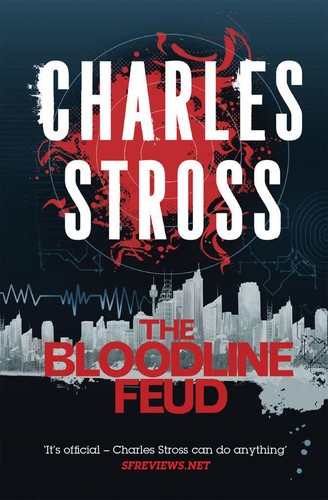Review: The Bloodline Feud
The Bloodline Feud
by Charles Stross
My rating: ★★★★☆
Read From: 1 October 2013—8 October 2013
Charlie Stross puts this story squarely in the real world. Sure, it's science fiction. But that only means that it has a fictional element to it. The rest of it reads as real as history.
Miriam Beckstein is a tech journalist in Boston and the adopted daughter of sixties radicals. She has a fairly normal life writing investigative journalism (and getting fired for uncovering the wrong bit of sleaze). Normal, that is, until her step-mother gives her a locket that her birth mother had when she died. Suddenly, Miriam finds herself in an alternate universe version of Boston. One where the Roman empire never ruled the known world, the Catholic church was never dominant, and the British empire never reached North America. Instead of Boston, she finds herself in the Gruinmarkt, a semi-Danish kingdom, stuck with medieval technology.
Besides a foreign land and a foreign language, Miriam has to contend with a new family. It turns out that she's a long lost duchess, from a whole family of world walkers—the Clan. Unfortunately for her, while her family has heard of women's lib, they hold no truck with it. They may have modern amenities and they may enjoy the high tech American lifestyle, but they're still medieval underneath. Like Saudi princes in New York—they may look sophisticated and urbane but back in the Kingdom they're still patriarchal jerks.
To make things worse, every member of the Clan is expected to contribute to the family business or die. When Miriam shows up, they waste no time trying to assimilate "Duchess Helge" into their pre-existing plans. Thus Miriam gets sucked deeper and deeper into her family's affairs, almost entirely against her will. She has to fight hard to have even the slightest control over what happens to her.
There's a lot going on in this story and most of it feels completely realistic. Miriam and her family are each acting in their own best interests. It's hard to fault either of them for acting as they do, given the constraints that they each operate under. Their motivations and actions all make sense, given the worlds they live in. None of which changes the fact that Miriam's situation well and truly sucks, even as she lives out the sci-fi dream of being able to travel between worlds.
The story would be well worth recommending just on that angle. But Stross didn't stop there. He also built the story around development economics. Miriam desperately wants to raise the standard of living of the Gruinmarkt from subsistence-level medieval farming to modern industry. But how do you bootstrap an entire kingdom into the modern era? Especially given that the only cargo you can move between worlds is what you can physically carry, your family distrusts your every move lest you rock their boat too much, and the people of the Gruinmarkt consider you a witch?
This book is fun, thought-provoking, and frustrating (in the best possible way). This is exactly what good science fiction should be.
This entry was tagged. Book Review Review
